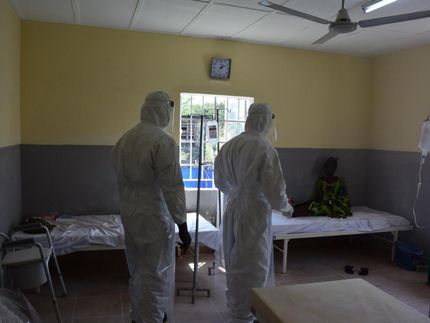Experts call for massive global response to tackle Ebola
The current Ebola outbreak now requires a "rapid response at a massive global scale", according to experts at the London School of Hygiene & Tropical Medicine.
Writing an editorial in Science, Professor Peter Piot, co-discoverer of the virus, says that the epidemic in West Africa is the result of a "perfect storm" involving dysfunctional health services, low trust in governments and Western medicine, denials about the virus's existence, and unhygienic burial practices.
The outbreak which began in December 2013 now spans five countries in West Africa and has so far killed nearly 2000 people, with the WHO predicting that 20,000 may become infected.
Professor Piot, Director of the London School of Hygiene & Tropical Medicine, writes: "This fast pace of Ebola's spread is a grim reminder that epidemics are a global threat and that the only way to get this virus under control is through a rapid response at a massive global scale—much stronger than the current efforts."
According to Professor Piot, international assistance to the growing local efforts must include support for disease-control activities such as the provision of protective equipment, patient care, and addressing the health, nutritional, and other needs of populations in quarantine.
It is also an opportune time to accelerate evaluation of experimental therapies and vaccines. With the WHO announcing that compassionate use of experimental therapies is ethically justified, even if they have not been tested in humans, Professor Piot comments that "an exceptional crisis requires an exceptional response."
In a separate article in Eurosurveillance, Professor Piot and colleague Dr Adam Kucharski, Research Fellow in Infectious Disease Epidemiology at the London School of Hygiene & Tropical Medicine, delve deeper into the challenges currently facing West Africa. They warn that the exponential growth in numbers makes tracing and surveillance for Ebola increasingly difficult, and that cases could double every fortnight if the situation remains the same.
Professor Piot and Dr Kucharski write: "Fear and mistrust of health authorities has contributed to this problem, but increasingly it is also because isolation centres have reached capacity. As well as creating potential for further transmission, large numbers of untreated – and therefore unreported – cases make it difficult to measure the true spread of infection, and hence to plan and allocate resources."
They also warn that it is not just Ebola patients who are affected by the outbreak. In cities like Monrovia in Liberia, the infection has led to the closure of most health facilities, and as a result, untreated injuries and illnesses have caused further loss of life.
Original publication
Most read news
Other news from the department science

Get the life science industry in your inbox
By submitting this form you agree that LUMITOS AG will send you the newsletter(s) selected above by email. Your data will not be passed on to third parties. Your data will be stored and processed in accordance with our data protection regulations. LUMITOS may contact you by email for the purpose of advertising or market and opinion surveys. You can revoke your consent at any time without giving reasons to LUMITOS AG, Ernst-Augustin-Str. 2, 12489 Berlin, Germany or by e-mail at revoke@lumitos.com with effect for the future. In addition, each email contains a link to unsubscribe from the corresponding newsletter.





















































